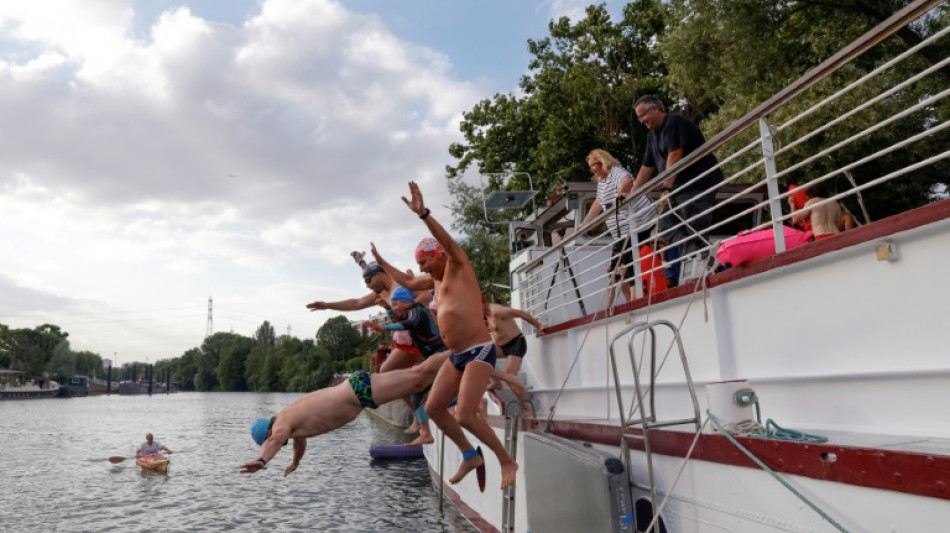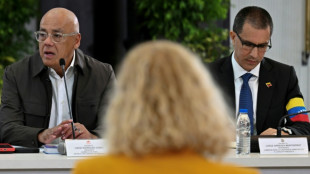
-
 Argentina govt launches account to debunk 'lies' about Milei
Argentina govt launches account to debunk 'lies' about Milei
-
Australia drug kingpin walks free after police informant scandal

-
 Dupont wants more after France sparkle and then wobble against Ireland
Dupont wants more after France sparkle and then wobble against Ireland
-
Cuba says willing to talk to US, 'without pressure'

-
 NFL names 49ers to face Rams in Aussie regular-season debut
NFL names 49ers to face Rams in Aussie regular-season debut
-
Bielle-Biarrey sparkles as rampant France beat Ireland in Six Nations

-
 Flame arrives in Milan for Winter Olympics ceremony
Flame arrives in Milan for Winter Olympics ceremony
-
Olympic big air champion Su survives scare

-
 89 kidnapped Nigerian Christians released
89 kidnapped Nigerian Christians released
-
Cuba willing to talk to US, 'without pressure'

-
 Famine spreading in Sudan's Darfur, UN-backed experts warn
Famine spreading in Sudan's Darfur, UN-backed experts warn
-
2026 Winter Olympics flame arrives in Milan

-
 Congo-Brazzaville's veteran president declares re-election run
Congo-Brazzaville's veteran president declares re-election run
-
Olympic snowboard star Chloe Kim proud to represent 'diverse' USA

-
 Iran filmmaker Panahi fears Iranians' interests will be 'sacrificed' in US talks
Iran filmmaker Panahi fears Iranians' interests will be 'sacrificed' in US talks
-
Leicester at risk of relegation after six-point deduction

-
 Deadly storm sparks floods in Spain, raises calls to postpone Portugal vote
Deadly storm sparks floods in Spain, raises calls to postpone Portugal vote
-
Trump urges new nuclear treaty after Russia agreement ends

-
 'Burned in their houses': Nigerians recount horror of massacre
'Burned in their houses': Nigerians recount horror of massacre
-
Carney scraps Canada EV sales mandate, affirms auto sector's future is electric

-
 Emotional reunions, dashed hopes as Ukraine soldiers released
Emotional reunions, dashed hopes as Ukraine soldiers released
-
Bad Bunny promises to bring Puerto Rican culture to Super Bowl

-
 Venezuela amnesty bill excludes gross rights abuses under Chavez, Maduro
Venezuela amnesty bill excludes gross rights abuses under Chavez, Maduro
-
Lower pollution during Covid boosted methane: study

-
 Doping chiefs vow to look into Olympic ski jumping 'penis injection' claims
Doping chiefs vow to look into Olympic ski jumping 'penis injection' claims
-
England's Feyi-Waboso in injury scare ahead of Six Nations opener

-
 EU defends Spain after Telegram founder criticism
EU defends Spain after Telegram founder criticism
-
Novo Nordisk vows legal action to protect Wegovy pill

-
 Swiss rivalry is fun -- until Games start, says Odermatt
Swiss rivalry is fun -- until Games start, says Odermatt
-
Canadian snowboarder McMorris eyes slopestyle after crash at Olympics

-
 Deadly storm sparks floods in Spain, disrupts Portugal vote
Deadly storm sparks floods in Spain, disrupts Portugal vote
-
Ukrainian flag bearer proud to show his country is still standing

-
 Carney scraps Canada EV sales mandate
Carney scraps Canada EV sales mandate
-
Morocco says evacuated 140,000 people due to severe weather

-
 Spurs boss Frank says Romero outburst 'dealt with internally'
Spurs boss Frank says Romero outburst 'dealt with internally'
-
Giannis suitors make deals as NBA trade deadline nears

-
 Carrick stresses significance of Munich air disaster to Man Utd history
Carrick stresses significance of Munich air disaster to Man Utd history
-
Record January window for transfers despite drop in spending

-
 'Burned inside their houses': Nigerians recount horror of massacre
'Burned inside their houses': Nigerians recount horror of massacre
-
Iran, US prepare for Oman talks after deadly protest crackdown

-
 Winter Olympics opening ceremony nears as virus disrupts ice hockey
Winter Olympics opening ceremony nears as virus disrupts ice hockey
-
Mining giant Rio Tinto abandons Glencore merger bid

-
 Davos forum opens probe into CEO Brende's Epstein links
Davos forum opens probe into CEO Brende's Epstein links
-
ECB warns of stronger euro impact, holds rates

-
 Famine spreading in Sudan's Darfur, warn UN-backed experts
Famine spreading in Sudan's Darfur, warn UN-backed experts
-
Lights back on in eastern Cuba after widespread blackout

-
 Russia, US agree to resume military contacts at Ukraine talks
Russia, US agree to resume military contacts at Ukraine talks
-
Greece aims to cut queues at ancient sites with new portal

-
 No time frame to get Palmer in 'perfect' shape - Rosenior
No time frame to get Palmer in 'perfect' shape - Rosenior
-
Stocks fall as tech valuation fears stoke volatility


As Olympics brace for Seine dip, rogue swimmers say water's fine
While the 2024 Olympics will stage events in the Seine river from the ornate Alexandre III bridge, a proud declaration of the waterway's environmental renewal, many swimmers in the capital are already defying decades-long bans to take the plunge.
Fears over pollution and safety led to a ban on swimming in the Seine and the Paris canals in 1923, though application of the rules has been relaxed in recent years.
One group of pioneers calls itself "Les Ourcq Polaires" -- a pun invoking polar bears and the name of the canal that is a favourite swimming site, running northeast out of the capital.
In five years, none of their swimmers have been fined, said one member, Laurent Sitbon, and they have been dragged out of the water by police only once.
Thirty years ago, Jacques Chirac, Paris mayor at the time, boasted that the Seine was becoming a "clean river" and that he would soon go for a swim -- though he never did.
But the 2024 Olympic Games organisers plan to hold the triathlon and the open-water swimming events in the Seine, with French authorities investing 1.4 billion euros ($1.5 billion) to clean up the river.
Already pools have been roped off in the Ourcq canal for the annual Paris Plages summer events in recent years, and permanent venues for the general public are scheduled to open in the region by 2025.
On the first Sunday in July, the Polaires organised a dip in the Seine. Swimmers lined the railing on a barge moored at the Ile-Saint-Denis, north of Paris, where the Paralympic athlete's village is being built.
"I can't wait to swim in the Seine! It's something else than a swimming pool," said one swimmer, Celine Debunne.
- 'We've paved the way' -
At 8 pm, with little traffic on the river, around 20 people took to the water for a one-hour outing, covering two kilometres in warm water.
At 25 degrees Celsius (77 Fahrenheit), the temperature "is borderline" too high for a club that has "polar" in its name, said one swimmer, Josue Remoue.
They are just downstream from the setting of French artist Georges Seurat's painting "Bathers at Asniere" from 1884, a time when frolicking in the Seine was common.
"People say, 'You're crazy, you'll get spots'," said Tanguy Lhomme, who was welcoming swimmers to his barge on the recent Sunday.
"As a result, they treat the Seine like a sewer."
Lhomme admits that when he started living on the river in 2017, "it was out of the question for me to get into it".
The club's members go out with inflatable buoys and in groups, which, along with their designated lifeguards, explains why they are "tolerated", Sitbon said.
"The Seine gets a lot of bad press, like all dark-coloured rivers. The colour will never make you dream," said Louis Pelerin, another swimmer.
The Paris police did not respond to requests for comment on their attitude to swimming in the river.
"It's not the pollution but a control of morals that's at the root of it," said Benoit Hachet, a Paris sociology professor who had also dived in.
After summer rains wash dirt from paths and roads into the water, the Parisian authorities post signs banning swimming on the canal banks.
"Pollution is always a great pretext and often a great lie", said Sibylle van der Walt, a German sociologist based in Metz in eastern France, where she campaigns for wild swimming access.
"Whereas in the Nordic countries, people swim at their own risk, in France the mayor is responsible," Van der Walt said.
In the heat waves of recent summers, growing numbers of Parisians have taken to cooling off in the canals.
"More than the Olympics, it's global warming," Hachet said. "In ten years, it'll be 40 degrees. People will go in the water whether its forbidden or not!"
Sitbon also said that attitudes were changing.
"There were only a few of us in 2017. We feel we've paved the way a little."
O.Salim--SF-PST



